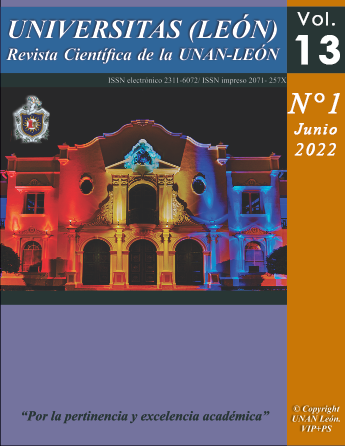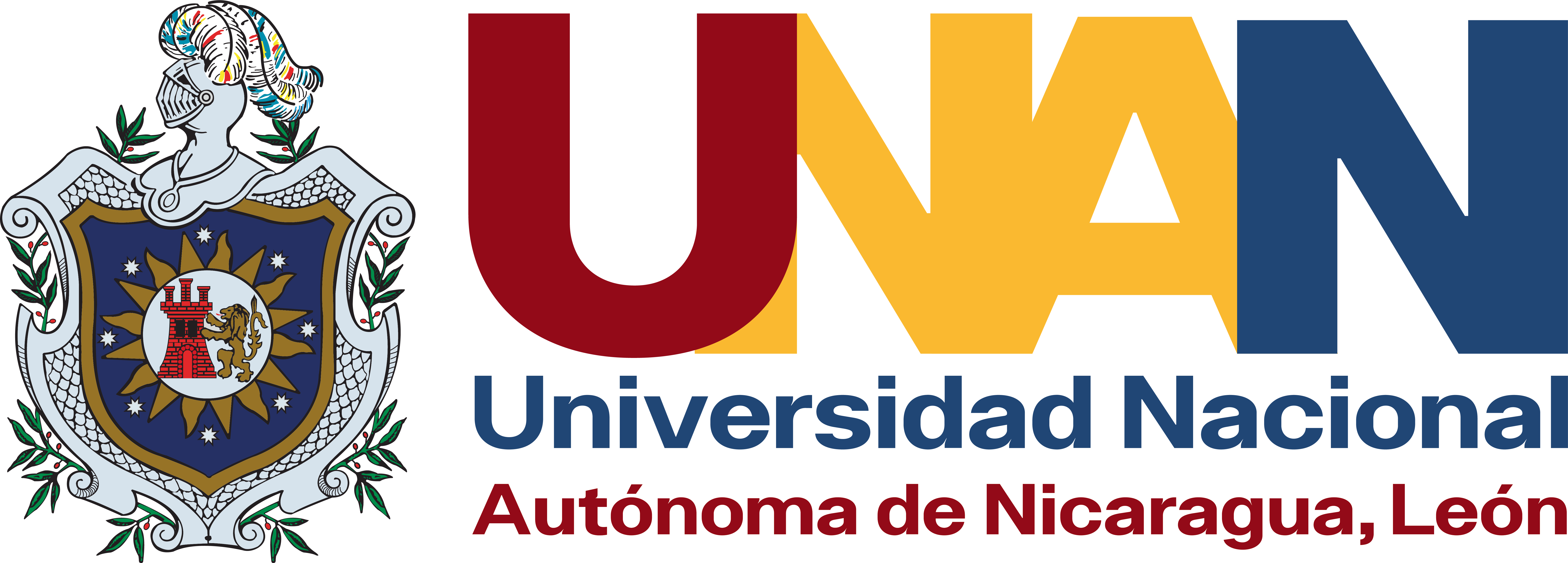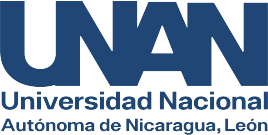Characterization of fleas (order siphonaptera) and factors that predispose to proliferation in canines
DOI:
https://doi.org/10.5377/universitas.v13i1.16636Keywords:
ectoparasites, host, fleas, pulicosis, arthropods.Abstract
This research consists of the characterization and description of fleas of the order Siphonaptera of veterinary interest and the factors that predispose their proliferation in domestic canines. The risks of zoonoses favored by the attachment relationship that exists between pets and humans constitute a risk to public health. Being a retrospective descriptive study, 83 domestic canines were sampled in the urban area of the city of Jinotega, which has a population of 13,043 canines (SILAIS 2020). From the individuals, 251 ectoparasites were collected that were later identified in the laboratory of the Marlon Zelaya Cruz University campus of Jinotega.The identified individuals were tabulated in a data matrix to calculate the ecological indices and factors that predispose proliferation by correlating abundance with host variables, economic indices, and fur morphology. Three species were identified: Ctenocephalides felis (73%), Ctenocephalides canis (26%), and Pulex irritans (1%). At the same time, intrinsic factors of the individuals and their relationship with the presence of ectoparasites were statistically analyzed using Pearson's correlation, determining that Siphonapteros do not have absolute specificity and the phenomenon of proliferation could be related to the sanitary management of the owners.
Downloads
References
Arrieta, M., Soto, R., Gonzáles, R., Nombera, J., Holguín, C., & Monje, J. (2001). Características de la población de roedores y pulgas en áreas de diferente riesgo para peste de tres provincias del departamento de Piura-Perú. Perú. Revista Peruana de Medicina Experimental y Salud Publica., 18(3-4). http://www. scielo.org.pe/scielo.php?script=sci_arttext&pid=s1726-46342001000200007
Beaucournu, J.-C., & Gomez-Lopez, M. S. (2015). Orden Siphonaptera. Ibero Diversidad Entomológica, 61A (2) ,1 -11.http://sea-entomologia.org/IDE@/ revista_61A.pdf
Cordero del Campillo, M., Rojo Vázquez, F. A., Martínez Fernández, A. R., Sánchez Acedo, M. C., Hernández Rodríguez, S., Navarrete López-Cózar, I., Diez Baños, P., Quiroz Romero, H., & Carvalho Varela, M. (1999). Parasitología Veterinaria (1.an Ed.). McGraw-Hill Education. https://doi.org/10.1017/ s0031182000022575
Dryden, M. W., Broce, A. B., & Moore, W. E. (1993). Severe flea infestation in dairy calves. Journal of the American Veterinary Medical Association, 203(10), 1448-1452. https://europepmc.org/article/med/8276708
Durden, L. A., Judy, T. N., Martin, J. E., & Spedding, L. S. (2005). Pulgas que parasitan a perros domésticos en Georgia, EE.UU.: composición de especies y abundancia estacional. Veterinary Parasitology, 130(1-2), 157-162.https://doi.org/10.1016/j.vetpar.2005.03.016
Estares P., L., Chávez V., A., & Casas A., E. (2000). Ectoparásitos en caninos de los distritos de la Zona Climática Norte de Lima Metropolitana. Revista de Investigaciones Veterinarias del Perú, 11(1), 21. https://doi.org/10.15381/ rivep.v11i1.6806
Franc, M. (1994). Pulgas y métodos de control. Rev. Sci. tech. Off. Int. Epiz. 13(4), 1019-1037. https://www.oie.int/doc/ged/D8934.PDF.https://doi.org/10.20506/rst.13.4.814
Franc, M., Choquart, P., & Cadiergues, M. C. (1998). Species of fleas found on dogs in France. Rev. Med. Vet, 149(2), 135-140. https://agris.fao.org/agris-search/search.do? recordID=FR1998001891
Garza H., T., & Coronel, J. (1970). Un método para la determinación del tamaño de muestra en encuestas sobre poblaciones finitas. Demografía Y Economía, 4(1), 121-128. Retrieved Octuber 27, 2020, from http://www.jstor. org/stable/40601870
https://doi.org/10.24201/edu.v4i01.1553
Gracia, M. J., Calvete, C., Estrada, R., Castillo, J. A., Peribáñez, M. A., & Lucientes, J. (2008). Pulgas que parasitan perros domésticos en España. Veterinary Parasitology, 151(2-4), 312-319. https://doi.org/10.1016/j.vetpar.2007.10.006
INIDE - Anuario Estadístico. (2020). Instituto Nacional de Información de Desarrollo - INIDE. https://www.inide.gob.ni/docs/Anuarios/Anuario20/ Anuario_Estadistico_2020.pdf
Krasnov, B. R. (2009a). Composition of the order. Functional and Evolutionary Ecology of Fleas, 3-8. https://doi.org/10.1017/cbo9780511542688.002
Krasnov, B. R. (2009b). Life cycles. Functional and Evolutionary Ecology of Fleas, 45-67. https://doi.org/10.1017/cbo9780511542688.006
https://doi.org/10.1017/CBO9780511542688.006
Krasnov, B. R. (2009c). Ecología de la Hematofagía. Functional and Evolutionary Ecology of Fleas, 154-181. https://doi.org/10.1017/cbo9780511542688.011
KHOKHLOVA, I. S. (1997). Relaciones huésped-hábitat como determinante importante de la distribución espacial de los conjuntos de pulgas (Siphonaptera) en roedores en el desierto de Negev. Parasitology, 114(2), 159-173. https:// doi.org/10.1017/s003 1182096008347
Lannino, F., Sulli, N., Maitino, A., Pascucci, I., Pampiglione, G., & Salucci, S. (2017). Pulgas de perros y gatos: especies, biología y enfermedades transmitidas por pulgas. Veterinaria Italiana, 53(4), 277-288. https://doi. org/10.12834/VetIt.109.303.3
Maleki-Ravasan, N., Solhjouy-Fard, S., Beaucournu, J.-C., Laudisoit, A., & Mostafavi, E. (2017). Las pulgas (Siphonaptera) en Irán: diversidad, rango de hospedadores e importancia médica. PLOS Neglected Tropical Diseases, 11(1), e0005260. https://doi.org/10.1371/journal.pntd.0005260
Marrugal, A., Callejón, R., de Rojas, M. et al. Morphological, biometrical, and molecular characterization of Ctenocephalides felis and Ctenocephalides canis isolated from dogs from different geographical regions. Parasitol Res 112, 2289-2298 (2013). https://doi.org/10.1007/s00436-013-3391-6
Medvedev, S. G. (1994). Base morfológica de la clasificación del orden Siphonaptera. Entomological Review, 73, 22-43 (in Russian).
Medvedev, S., Lobanov, A. & Lyangouzov, I. (2005) World database of fleas (Parhost). Available online at http://www.zin.ru/Animalia/Siphonaptera. Google Scholar
Moreno, E. C. (2001). Métodos para medir la biodiversidad. (Manuales y Tesis) - Sociedad entomológica Aragonesa, vol. 1. https://www.researchgate.net/ publication/304346666_Metodos_para_medir_la_biodiversidad
Oksanen, J., Blanchet, G., Friendly, M., Kindt, R., Legendre, P., McGlinn, D., Minchin, P., O'Hara, B., Simpson, G., Solymos, P., Stevens, H., Szoecs, E., & Wagner, H. (2019, 1 septiembre). Package 'vegan'. Community Ecology Package. https://cran.r-project.org/web/packages/vegan/vegan.pdf
Pozo, E., Troncos, C., G., Palacios, F., A., Arévalo, G., F., Carrión, T., G., & Laguna- Torres, V., A. (2005). Distribución y Hospederos de Pulgas (Siphonáptera) Piura. Revista Perú de Medicina Experimental y Salud Pública., 22(4), 316-320. https://www.redalyc.org/pdf/363/36322410.pdf
Rinaldi, L., Spera, G., Musella, V., Carbone, S., Veneziano, V., Iori, A., & Cringoli, G. (2007). Una encuesta de pulgas en perros en el sur de Italia. Veterinary Parasitology, 148(3-4), 375-378. https://doi.org/10.1016/j.vet par.2007.06.036
SILAIS (2020). Programación de Jornada de Vacunación Antirrábica Canina 2020.Ministerio de Salud, SILAIS Jinotega.
Smit, F. G. A. M. (1982). Siphonaptera. Synopsis and classification of livingorganisms,2(Parker,S.P.),557-563.http://www.sidalc.net/cgi-bin/ wxis.exe/?IsisScript=FCL.xis&method=post&formato=2&cantidad= 1&expresion=mfn=000326.
Soulsby, E. J. L & Mönnig, H. O. (Hermann Otto), 1897-1978. Helmintología y entomología veterinaria (1982). Helminths, arthropods and protozoa of domesticated animals (7th Ed). Baillière Tindall, London.
Downloads
Published
How to Cite
Issue
Section
License
Copyright (c) 2022 National Autonomous University of Nicaragua

This work is licensed under a Creative Commons Attribution-NonCommercial-ShareAlike 4.0 International License.
Copyright © 2025 Universitas (León), Revista Cientifíca de la UNAN-León. Academic Direction. Research Department. Publication and Scientific Event Unit.










